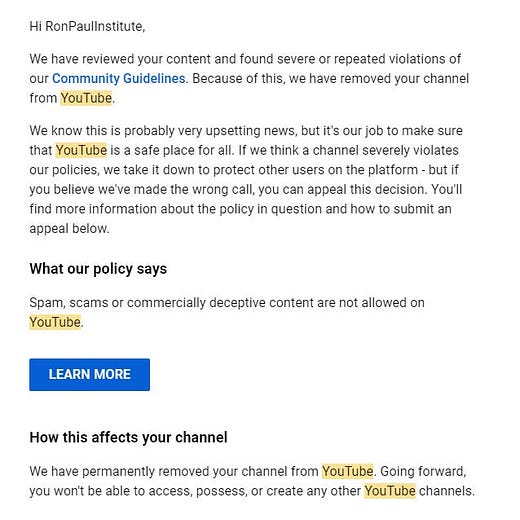E-Pluribus | October 1, 2021
Our institutions' greatest enemies are often themselves, how originalism falls short, and corporations exploiting 'woke' causes.
A round up of the latest and best writing and musings on the rise of illiberalism in the public discourse:
Zaid Jilani: Our Institutions Keep Undermining Themselves
When institutions begin to lack objectivity and rigor in the pursuit of truth, it is perhaps inevitable that eventually the very definitions of objectivity and rigor, among others, would be called into question. Zaid Jilani writes at Persuasion about a recent incident involving the Urban Institute and uses it as a springboard to address the larger issue of how like institutions can be their own worst enemies.
[T]he point of research is not to promote a particular ideology or agenda. The point of research is to tell us what is true. Objectivity lets us see the world as it is, rather than what we might wish it were. It’s important to acknowledge reality and settle on a good set of facts before we do anything else. We can then use that knowledge as we see fit, based on our values—which is where ideology and argument about what should be done can come into the picture.
Unfortunately, many institutions we would expect to embrace the telos of truth are now under pressure to instead adopt the telos of social justice. One of the unfortunate undercurrents of this rebellion against old-fashioned objectivity and truth-seeking is the misperception that these concepts are the lone purview of European-Americans, who have imposed them on all institutions. Farrell seems to be under the impression that objective research is all generated by, as she describes them, “white cisgender people” at the expense of, well, everybody else.
Farrell is not alone in this view. Last summer, the Smithsonian Institution’s National Museum of African American History and Culture published a graphic on its website that depicted “objective, rational linear thinking” as a facet of “whiteness & white culture.” Facing criticism, the museum later removed the graphic, but the fact that one of America’s pre-eminent cultural and historical institutions allowed this to happen is a sign of how far the attack on the scientific method has gone.
Yet objectivity and rigor, far from promoting racism, have often provided the data that serve as the antidote to racism. Look at the example of W. Montague Cobb, an African-American physician and professor of anatomy who used the scientific method to help debunk racial aspects of biodeterminism, which claims that different “races” of people had fundamentally distinct bodies that made some inferior or superior to others.
Read the whole thing.
Hadley Arkes: ‘Originalist’ Judges Lose Sight of Truths That Precede Law
Of all the theories of constitutional interpretation, conservatives often find originalism most compelling. Hadley Arkes at The Wall Street Journal writes that even originalism can fall short, however, if moral and scientific foundations that preceded laws and the Constitution are not also considered when approaching issues such as abortion and marriage.
Conservatives, however, have even taken it as a code of conduct to steer around the questions of moral substance at the heart of the cases. In Obergefell v. Hodges (2015), the case that legalized same-sex marriage, Antonin Scalia, one of my favorite justices, wrote in dissent that “it is not of special importance to me what the law says about marriage” but “it is of overwhelming importance . . . who it is that rules me”—namely “a majority of the nine lawyers on the Supreme Court.”
That question of jurisdiction, of who has the authority to decide, is always critical, for it reaches the moral logic underlying the separation of powers. In Boumediene v. Bush (2008), Justice Anthony Kennedy led the court in extending its reach into the battlefields. That move violated one of the deepest principles of the American regime: that the safety of the American people cannot be put in the hands of unelected officers, whether in Westminster or in the courts, who bear no direct responsibility to the people whose lives are at stake.
Yet conservative jurisprudence has too often been distracted in a stylish way by procedural formulas that divert the judges from the substance of the cases. And so we’ve heard for years that federal judges can’t declare a right to abortion because abortion is nowhere mentioned in the Constitution. But neither is marriage mentioned in the text, and no conservative justice now would call into question Loving v. Virginia (1967), which struck down the laws that barred marriage across racial lines. As Notre Dame’s Gerard Bradley observed, the federal government has had ample reason to deal with the question of abortion—say, in the military and diplomatic outposts abroad or in the District of Columbia—despite the Constitution’s silence on the subject.
Read it all.
Vivek Ramaswamy: A Peek Inside Corporate America’s Ascendant Woke-Industrial Complex
In a new book, Woke, Inc.: Inside Corporate America’s Social Justice Scam, author and former Goldman Sachs employee Vivek Ramaswamy shines a light on how corporations cynically exploit progressive social causes for their own ends. In an excerpt of the book at Quillette, Ramaswamy tells how Goldman used “diversity” as a public relations tool without actually making significant genuine progress.
Nearly a decade and a half after I’d learned it, the Goldman Rule had only grown in importance. In January 2020, at the World Economic Forum in Davos, Goldman Sachs CEO David Solomon declared that Goldman would refuse to take companies public unless they had at least one “diverse” member on their board. Goldman didn’t specify who counted as “diverse,” other than to say that it had a “focus on women.” The bank said that, “this decision is rooted first and foremost in our conviction that companies with diverse leadership perform better,” and that board diversity “reduces the risk of groupthink.”
Personally, I believe the best way to achieve diversity of thought on a corporate board is to simply screen board candidates for the diversity of their thoughts, not the diversity of their genetically inherited attributes. But that wasn’t what bothered me most about Goldman’s announcement. The bigger problem was that its edict wasn’t about diversity at all. It was about corporate opportunism: seizing an already popular social value and prominently emblazoning it with the Goldman Sachs logo. This was just its latest version of pretending to plant trees in Harlem.
The timing of Goldman’s announcement was telling. In the prior year, approximately half the open board seats at S&P 500 companies went to women. In July 2019, the last remaining all-male board in the S&P 500 appointed a woman. In other words, every single company in the S&P 500 was already abiding by Goldman’s diversity standard long before Goldman issued its proclamation.
Goldman’s announcement was hardly a profile in courage; it was just an ideal way to attract praise without taking any real risk: another great risk-adjusted return for Goldman Sachs.
Read it all here.
Around Twitter
Thomas Chatterton Williams on the myopia that can afflict those who value power over principle:
Zaid Jilani with some thoughts on the story of UCLA’s Gordon Klein, nearly fired for treating his students equally, and what it says about the expectations of today’s college students:
Youtube briefly removed Ron Paul’s “Ron Paul Institute,” later reinstating it after calling the removal a “mistake”:
And finally, the New York Times with a story about a Yale professor who resigned in protest over alleged pressure from conservative donors:














